![]()
Well I’m finally stumped for words. A party affiliated president, now
has the triple roles of president, head of the military and head of
the ‘neutral’ caretaker government. While rumours of a military
takeover abound, and the prime minister’s son threatens that they will
not go to the streets ’empty handed’, the news that the leader of the
opposition has not threatened immediate protests, but has rather opted
to see how the new head of the caretaker government conducts himself,
is a healthy sign. Too many lives have already been lost.
A lot of changes need to take place to erase the mistrust created. A
genuinely non partisan group of advisers need to be selected, the
election commission and the voters list, both clearly not neutral,
need to be changed, and he has to clearly demonstrate that he is no
longer a puppet. Unlikely based on his track record, but one can hope.
Given the current mood, another sham election will surely light the
fuse.
Shahidul Alam
29th October. Dhaka
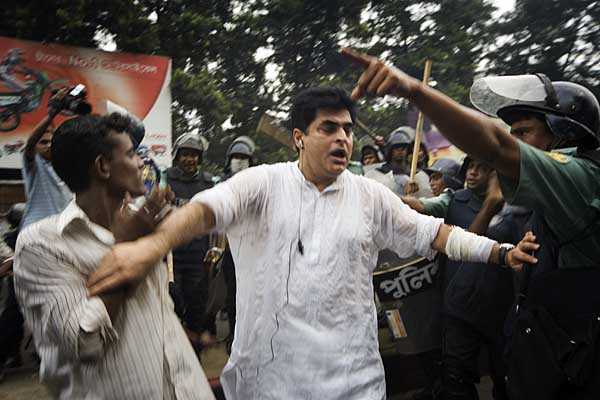
Clashes between opposition and Jamaat due to demand for neutral head of caretaker government. (upload incomplete)
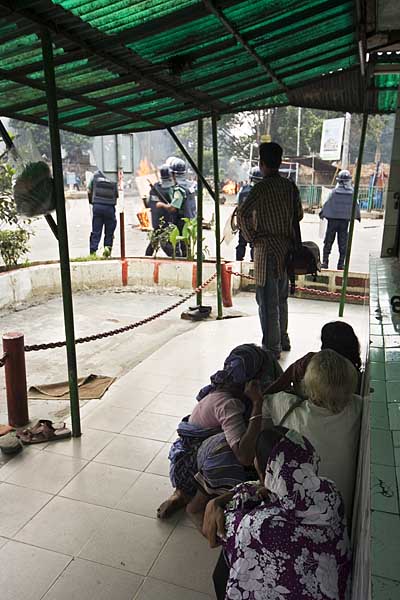
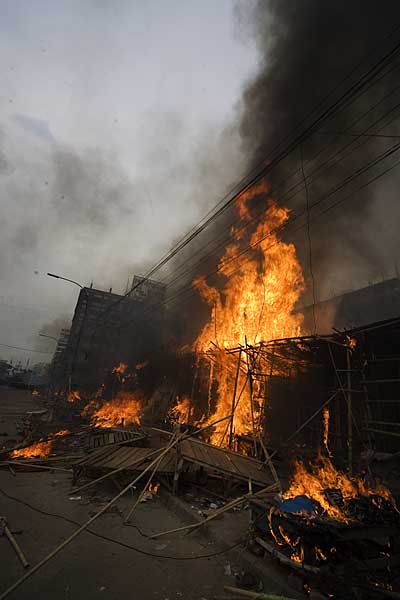
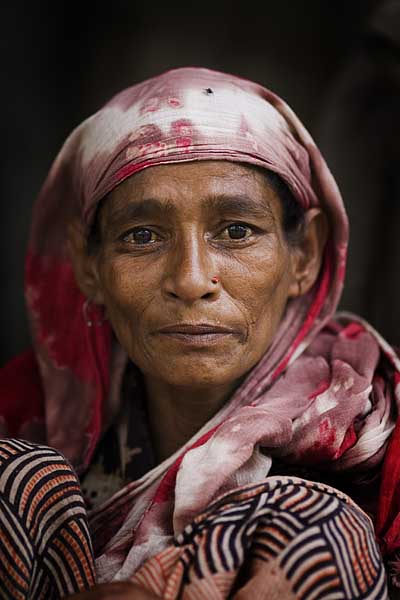
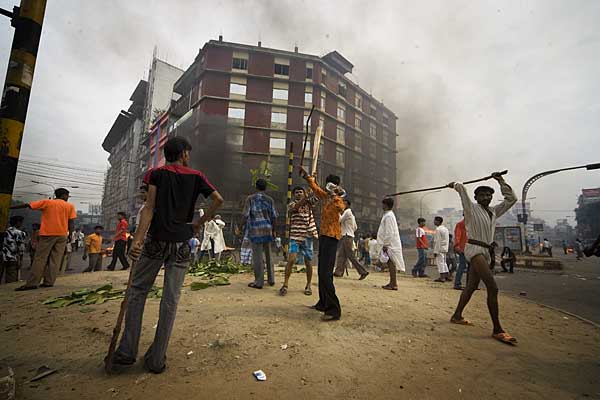
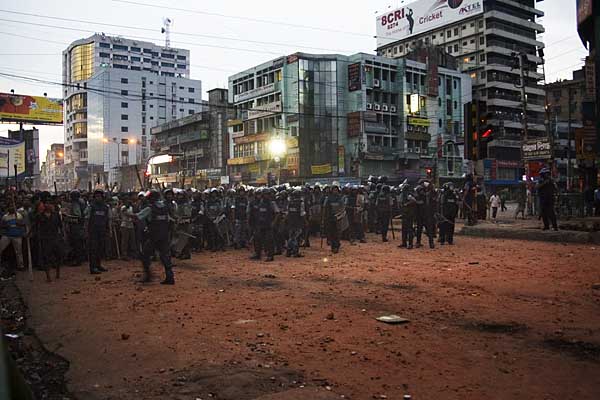
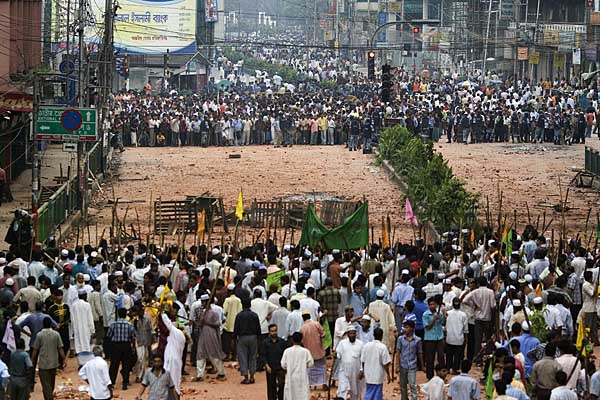
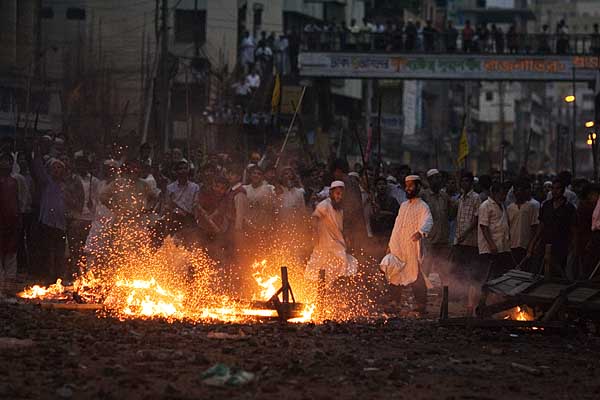
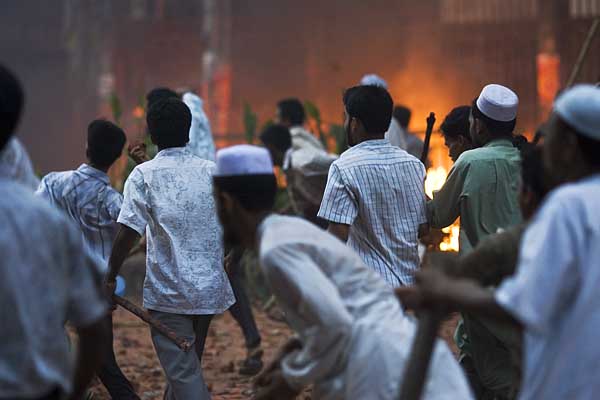
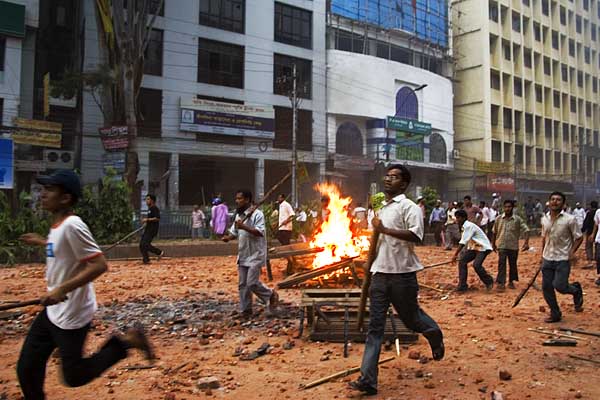
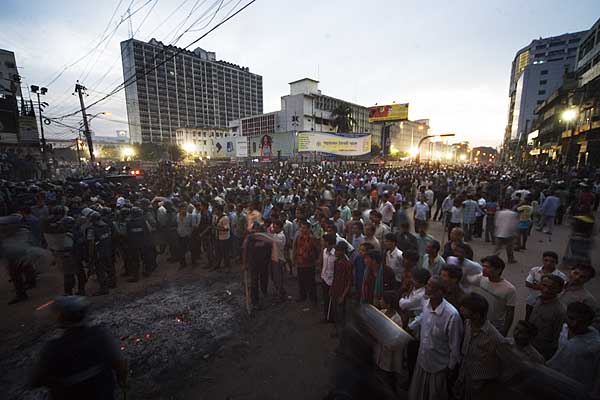
Above photographs taken on 28th October 2006 by Shahidul Alam.
And today 29th October 2006, a party affiliated president, makes himself president, head of military and head of ‘neutral’ caretaker government. Today’s photographs taken by Shehab Uddin. No unauthorised copying of any kind. To publish these or high res images, contact library@drik.net. More pictures and text to follow.
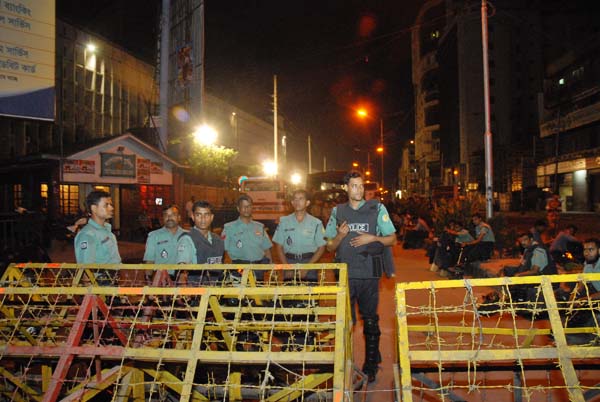
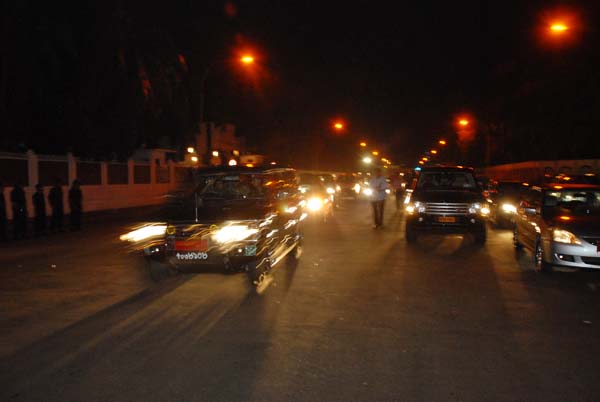
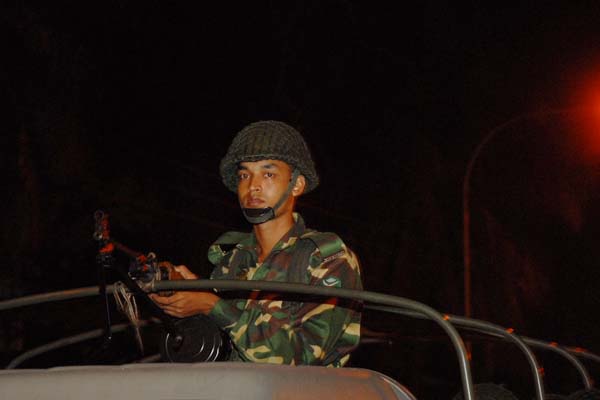
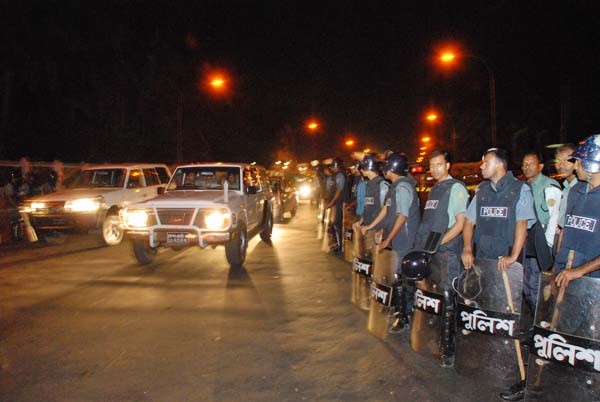
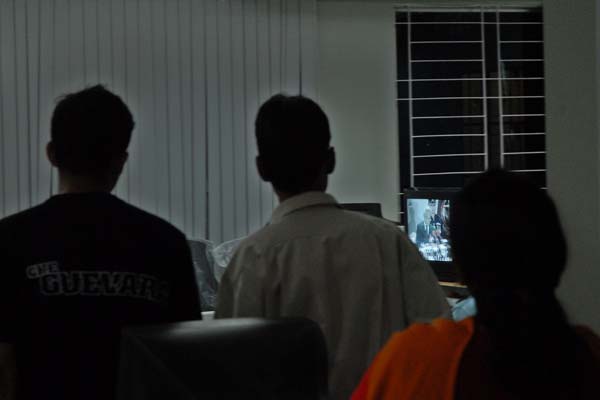
Category: security
The Terrorist
Subscribe to ShahidulNews
![]()
The word “terrorist” was not in fashion in 1971. The Pakistanis called them “miscreants”. They called themselves the “Mukti Bahini” (freedom fighters). The ordinary Bangladeshi also called them “Muktis”, and therein lay their strength. They had limited resources, and very little training. They survived because the people risked their lives in giving them shelter, food, money, and a place to hide. They waved from the rooftops when the Mukti planes came to attack Dhaka. Trenches had been built, but they were too busy cheering to remember them, for in some ways, they too were Muktis.
Rejoicing in our independence, we quickly forgot those nine months, and treated the people in the Chittagong Hill Tracts much as the Pakistanis had treated us. The same oppression, the same genocide. The Bangladesh government called them “insurgents”. They called themselves the “Shanti Bahini”, (Peace Brigade), as did the other hill people. Shanti Bahini, years later, fought the Bangladeshi military junta, much as the Muktis had fought the Pakistanis, years before. Again the junta retaliated by killing the most vulnerable. It was the military that the people were terrified of. The Muktis and the Shanti Bahini were their saviours.
The main “terror” today is from the guns in the streets, the knee-capping, and the acid throwing. We call the people who do this, “shontrashis”. While the Muktis did strike terror in the hearts of the Pakistani soldiers, the goal was to liberate the people. The Shanti Bahini tried to defend their people from genocide. The shontrashis use terror to subjugate people into paying protection money, to gain control, to remove competition for government contracts, and to satisfy their lust. Protected by the politicians in power, the shontrashi and the junta are the only terrorists we have known.
Terror is not about danger itself, but about the fear of danger. Does the ordinary New Yorker, wake up in the morning expecting to die? The answer is no. Does the ordinary Afghani child lie sleepless at night in fear of the bombs from the sky and the ones lurking in the ground? The answer is a sad yes.
First published in ‘Banglarights” Bangladesh Human Rights Portal
We Would Have Had So Much Fun Shooting Them Down
Paris, Charles De Gaulle airport, 13th October 2001.
The documents were impressive. I had an official letter from Le Directeur des Rencontres, Ministere de la Culture of Mali certifying that a visa was awaiting me in Bamako, a certificate of accreditation and an invitation letter from Olivier Poivre d’Arvor, a well-known personality in France and the director of AFAA/French Ministry of Foreign Affairs. Still, I left well in time, knowing there might be problems. I was to do a report for the Prince Claus Foundation in the Netherlands and was on my way to attend the Fourth African
Photography Encounter in Bamako. I also had my yellow fever certificate.
None of what happened at the airport seemed sinister, until you realised what it was leading to. The immigration in Hall B in Terminal 2 at Charles de Gaulle is BEFORE the check-in desk. The questions started well before then. Where was I going, what did I have with me, why was I going. We went over and over the same things.
Lengthy manoeuvres that kept slowing me down. Still, there was almost an hour to go to departure time when I reached the check in desk, and immigration had already been done. I had a confirmed ticket, so I wasn’t worried. There were plenty of passengers at the check in desk, but when it came to me, the officer calmly said, “Sorry sir, the flight was closed at 10 o’ clock.” No degree of persuasion, or my insistence that I had arrived at the designated place in the airport well in time and that the delay was due to airport officials, seemed to matter. The fact that immigration, security and airlines check-in desks operate independently, made it easier for the check-in desk to deny responsibility. I had one of these cheap tickets, non- refundable, non-endorsable, so I was stuck.
Eventually, when I pointed out to the individuals who had delayed me, they did offer me an alternative booking for the outgoing flight. I could leave on a date FOLLOWING my date of return. No doubt they found it funny. I offered to pay to get onto another flight, but that too couldn’t apparently be done. By then I had worked out what was going on, and asked them to book me on the date they suggested, AFTER my due date of return. This they did. I could see people were still checking-in, and knew, if I could get through the blockade, I would get on the flight.
So I took a flight out to the nearest airport from which I could get a connecting flight. The idea being, that if I went through the check- in procedure elsewhere, where such barricades might not be present, they would no longer have grounds for refusing to let me fly. I left early in the morning from my hotel in Strasbourg, taking the tram and the bus through the fog at night to be the first person to arrive at the check-in desk. The woman at the desk at this small airport was extremely helpful. When I said I wanted to go to Bamako with a connecting flight, she immediately took my ticket and issued me a
luggage tag to Bamako. Then of course she discovered I was not booked on the flight. She made a tentative booking, issued me a `boarding pass’ without a seat number, and put in a note in the computer that I was a passenger bound for Bamako. She even gave my luggage (now tagged for Paris, in place of Bamako) a priority tag, so I would not lose time changing planes.
The luggage arrived early as planned. I rushed across to terminal B, arriving well in time to lay a claim to a seat. People were still checking in. When I approached the officer in charge, she whipped the temporary boarding pass from my hand, tore it to bits, and with a dramatic gesture, let the flimsy flight coupon fall to my hand. “The are no seats” was the terse reply.
This vulgar demonstration of power, reminded me of the article I had been reading on the 13th, the day I was first refused onto the plane, in the Wall Street Journal Europe (October 12-13, 2001, Brussels, page 3). [Lt. Ken, a 28 year old pilot from Washington state was munching on Twizzlers candy at the controls of his jet when the 57- millimeter artillery rounds started exploding below. “I’ve been peppered before, hunting pheasant, but it doesn’t really compare.” He said in Vinson’s ready room. Vinson’s air wing is trying to put all ts pilots through combat flights ? learning the tricks “before the other guys get smart,” as Capt. Wright puts it.
Capt. Wright saw two MIGs parked at the end of the runway. He fired a laser-guided bomb at one; the pilot of another F-14 nearby hit the second. “When they blew, they blew big ? you could see they were full of fuel and ammunition.” But infrared images indicated that the MIG engines were cold, which means that the jets weren’t about to take off ? much to Capt. Wright’s annoyance. “We would have had so much fun shooting them down” he said. As Capt. Wright flew back to the ship, chewing on a peanut-butter sandwich and sharing his post-battle emotions with the flight officer sitting behind, they suddenly had to dispense death to a different enemy: a cockroach had crawled up the airman’s legs. “We got a little bit of hilarity on that,” he said.]
John Wayne might have died, but these Texan-led soldiers could well have been riding into the prairie to `cut em off at the pass’. Five hundred years later, they continue to find new `Indians’ to `dispense death to’.
As for the luxuriant growth of hair on my face. I’ve decided to let it grow longer.
Shahidul Alam
Tue Oct 16, 2001
